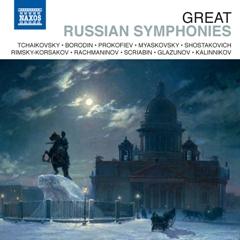Great Russian Symphonies, Vol.9 (2012)
Great Russian Symphonies, Vol.9 (2012)

Alexander Scriabin - Symphony No. 3, 'Le Poeme Divin' 1. I. Lento 00:01:36 2. II. Luttes (Struggles) 00:25:37 3. III. Voluptes (Delights) 00:13:44 4. IV. Jeu divin (Divine Play) 00:11:10 5. Alexander Scriabin - La Poeme de l'extase (The Poem of Extasy), Op. 54, "Symphony No. 4" 00:24:10 Moscow Symphony Orchestra Dmitri Lokalenkov - soloist Igor Golovschin - conductor
Scriabin's Symphony No. 3 is the first of the composer's major orchestral works to bear explicit extramusical intent. The titles appended to each movement are as colorful as the music itself : "Luttes" (Struggles), "Voluptes" (Pleasures), and "Jeu divin" (Divine Play). The work's performance instructions go well beyond the traditional Allegro or Andante; here, markings such as "mysterieux," "tragique," and "sublime" appear in Scriabin's orchestral music for the first time. These indications represent far more than superficial descriptions; indeed, they demonstrate the struggle Scriabin and his contemporaries faced in trying to express the turbulent emotions of their music in conventional terms. In the program notes for the premiere, Scriabin noted that his "Divine Poem" represents the growth of the human spirit as it is freed from legends and mysteries, passes through pantheism, and ultimately affirms its liberty and unity with the universe.
"Luttes" is meant to represent the conflict between man enslaved by another God versus man himself in the role of God himself. It opens with an ominous theme in the brass; the strings soon enter with an agitated minor-mode motive that gradually migrates toward a theme in the major mode. From this point, there is no longer any solid sense of tonality, and shifts between major and minor occur suddenly and frequently. Dynamic levels are similarly in constant flux, and at times it seems as though climaxes spring up every few measures. Nevertheless, Scriabin's mastery is such that he is able to bind this long movement into a cohesive whole despite its inescapably episodic nature. "Voluptes" is pure sonic sensuality. From a quiet opening of saccharine music for winds and strings, the movement gradually builds into an expression of unbridled, powerful sensuality. This movement leads without interruption into "Jeu divin," where the spirit, freed from submission to a higher power, relinquishes itself to the supreme joy of a free existence. This is rich and richly exciting music, characterized by a torrent of unpredictable changes of mood. The work ends, with a note of gentle ecstasy, on a Brahmsian final chord. Though the work clearly lacks the maturity of later masterpieces like the Poem of Ecstasy (1905-08) or Prometheus (1908-10), it is still a highly individual and worthy effort that provides a fascinating glimpse into the development of Scriabin's singular aesthetic. ---John Dobson, allmusic.com
During the decade immediately preceding the First World War, the European musical scene was developing at an astonishing pace. Schoenberg moved from the massive, two-hour-long Gurrelieder, with its epic Romantic text and equally lush score, to the concise and stringent Piano Pieces, Op. 11 in a matter of just eight years, while by 1913 Stravinsky was ready to unveil his Rite of Spring. Although Scriabin stayed apart from these developments, his extraordinary innovations during the first decade of the century are at the very heart of this musical realignment. Although generally regarded as a composer for the piano, Scriabin is the author of five large-scale orchestral works (all composed between about 1900 and 1910) that showcase his revolutionary artistic genius in much the same way that the piano sonatas do. In Le poème de l'extase (Poem of Ecstasy), Op. 54, of 1908, the journey towards complete atonality and thematic fragmentation is by no means complete (the real musical goal would not be reached until the final few sonatas), but enough of the composer's increasingly complex mystical and theosophical views saturate the score to bring to it a density and complexity of expression denied to the three symphonies that precede it. It is a work that stands with great pride beside the massive German orchestral works of the period, both a mesmerizing portrait of those troubled years and, at the same time, a uniquely intimate picture of an artist's fascinating mind. The Poem was originally to take the shape of a fourth symphony, but Scriabin decided to cast it instead as a 20-minute orchestral poem based on his own Poem of Ecstasy, a 369-line poem celebrating and glorifying his own creative powers (which would, according to his vision of reality, play a crucial role in the approaching transformation of the world). The orchestra is large -- twice the classical contingent of winds and brass are required -- and, unlike Mahler or Schoenberg, who used even greater forces than this, by no means sparingly used. Although Scriabin's orchestral experience was limited, he was one of the early twentieth century's masters of orchestration, and throughout the Poem of Ecstasy his orchestral writing is brilliant. Themes are used to delineate mental and emotional states (in this way the late orchestral works are quite unlike the late piano works, which employ an almost exclusively textural and harmonic narrative structure). At the opening, the flute gesture searches longingly, the clarinet dreams, and the trumpet foretells a still-distant victory. An equestrian stride commences, only to be abruptly halted to make room for an ardent violin solo. As the many levels of expression unfold the music is highly chromatic, but not particularly dissonant. A glorious climax draws the music to an appropriately ecstatic finish in C major -- a key that had, for Scriabin, a cleansing and focusing quality. ---Blair Johnston, allmusic.com
download (mp3 @320 kbs):
yandex mediafire ulozto cloudmailru gett








